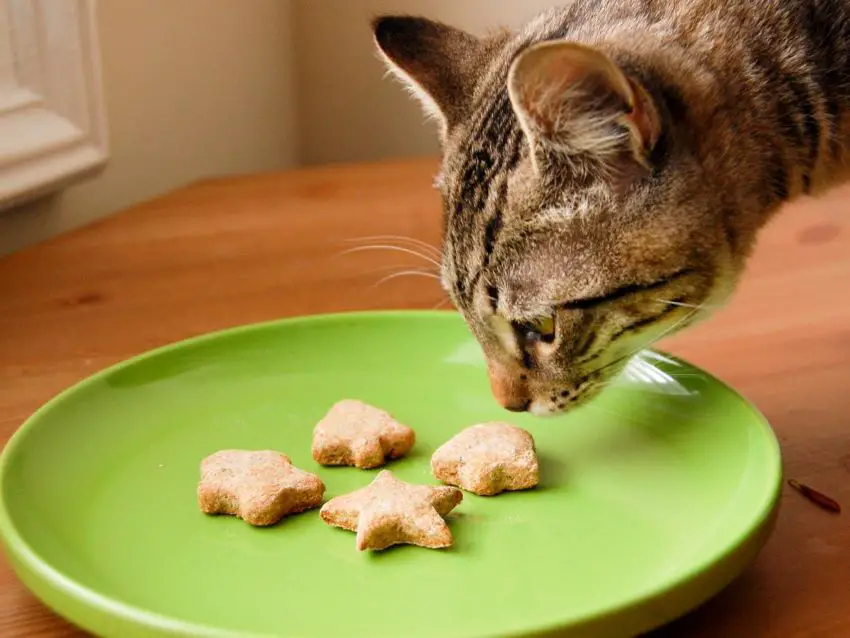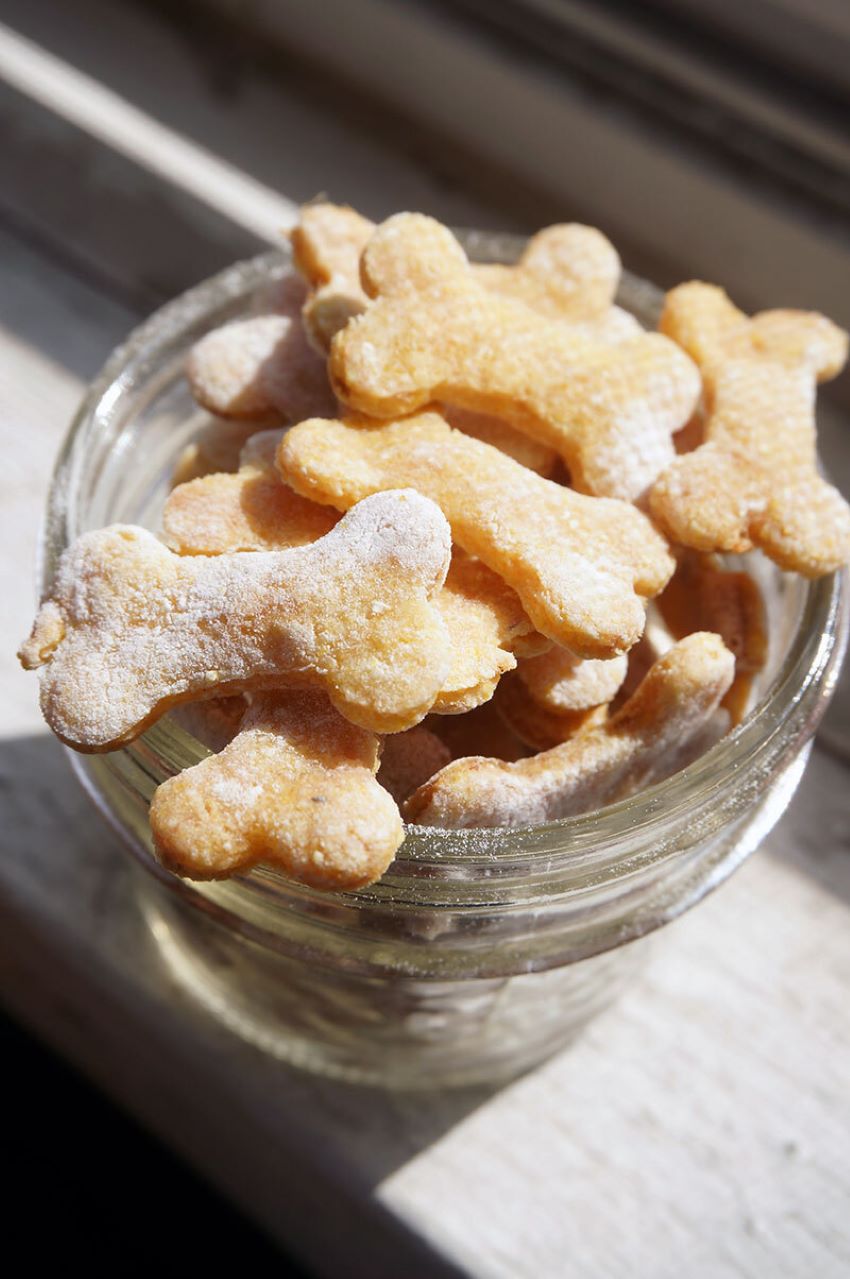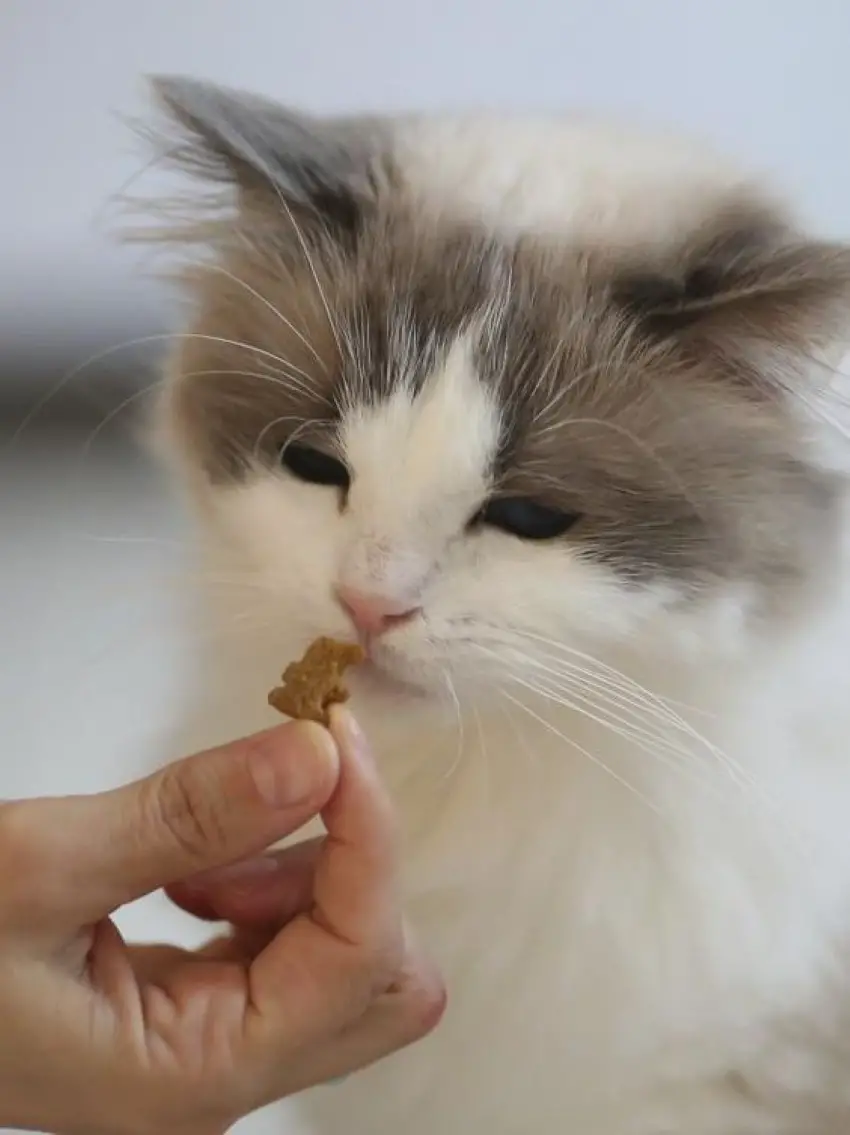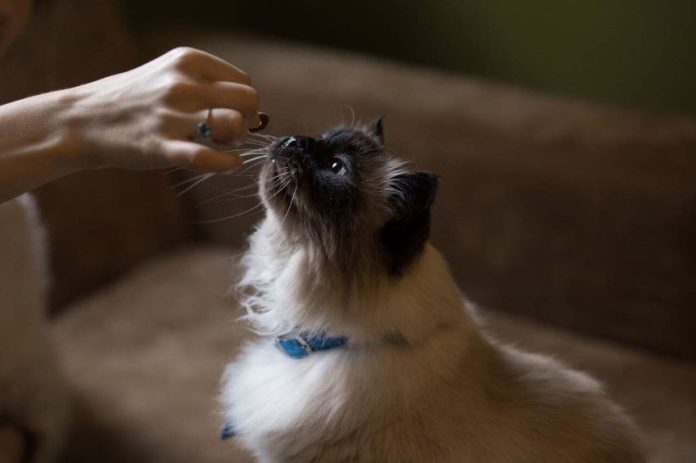Since my story a few weeks ago about homemade dog biscuits, I’ve been eager to make treats for my two cats and write this next article. Many of the recipes I found used canned tuna (Luna and Sissy’s favorite) as a base, and I thought they would be so pleased. Hah.
Cats are notoriously finicky, and mine have never had “treats” before: in their world, there’s wet food, kibble and the occasional creature (small lizards, big cockroaches and, sadly, the random hummingbird). Decidedly unimpressed with my first try, they batted the “treats” around and walked away.
Apparently, more research was needed.
Some cats are fussy about the size of what they’re eating and may not like anything too big. When I broke the treats I’d made into smaller, pea-size pieces, they cautiously ate them. But when presented with the option of store-bought treats or my homemade ones … well, you know what happened.
Back to the drawing board: “Kitty Pavlova,” with just two simple but tasty ingredients, seemed promising (and easy) and was met with unrestrained enthusiasm by my tasters. Should I ever again want to woo my cats with treats, this is the direction in which I’ll go. See below for the recipe.

But as I found more and more complicated recipes, I had to wonder, why bother? My cats have little interest in “pleasing” me, and I’m not trying to train them. They — like me, ahem — have no need of between-meal snacks. What’s the point?
Philosophical musings aside, should you, however, want to make treats for your feline friends, start with a protein like canned tuna in water, canned or cooked chicken or their favorite canned cat food; fresh-cooked fish is too flaky to hold together. Add an egg and some kind of binder: gelatin sheets (not Jello!), cornmeal or powdered milk.
Feeling creative? Try adding some manteca or other animal fat, unsalted beef, chicken or bone broth or, if you can find them at an Asian food store, dried bonito flakes. Some cats also like greens like cilantro or spinach; others love to eat catnip.
Because cats are more finicky than dogs, your knowledge of what things they already like to eat should be your guide. My cats, for instance, will happily eat corn chips if allowed, so using cornmeal as a binder seemed to make sense.
That said, I discovered my limits: if I want to give Luna and Sissy a special treat, I’ll stick to a forkful of canned tuna or some pieces of leftover chicken. Your cats will let you know what works for them.

Kitty Pavlova
Quite possibly this will work with canned cat food too. If you try it, let me know!
- 1 egg white
- 1 5-oz. can water-packed tuna, thoroughly drained OR 1 5-oz. can cooked chicken OR ½ cup shredded cooked chicken
Preheat your oven to 350 F and line a baking sheet with parchment paper. Beat egg white until stiff peaks form. In a separate bowl, mince and mash tuna or chicken as finely as possible.
Add two tablespoons of the whisked egg white to tuna/chicken; mix thoroughly until there are no lumps. Gently fold in remaining egg white.
Pipe or spread the mixture in lines about a half-inch wide and a quarter-inch high onto a baking sheet.
Bake about 20 minutes until dry to the touch and beginning to brown along the edges. Cool, then break into pieces. Store in airtight jars for up to a month.

EZ Kitty Treats
- 1 can cat food
- Optional: pinch of catnip
Preheat oven to 375 F and line a cookie sheet with parchment paper. Stir catnip and canned food together to a mousse-like consistency.
Put mixture in a Ziploc bag, snip a small corner off and use it like a pastry bag to make small, evenly spaced dots on the baking sheet. Bake 8–10 minutes.
Remove from oven. (Mixture will be slightly soft.)
Once cooled, roll the half-baked mixture into tiny quarter-inch balls.
Store in an airtight container.

Tuna Biscuits
- 1 5-oz. can tuna packed in water, well-drained
- 1 whole egg
- 3 to 4 Tbsp. cornmeal OR whole wheat flour
- 1 Tbsp. powdered milk
- Optional: 1 tsp. catnip
Preheat oven to 400 F. Combine everything in a bowl and mix until the consistency of cookie dough.
Pinch into tiny bite-sized pieces (about one-quarter teaspoon each) or press into thin graham-cracker-sized layers onto a parchment-lined cookie sheet.
Bake about 15 minutes till firm but not dried out. Cool.
Break layers into small pieces. Store refrigerated in an airtight container for 10–14 days.

No-Bake Turkey-Pumpkin Kitty Treats
- ⅓ cup canned pumpkin (no added salt or sugar)
- ¼ cup cooked turkey or chicken meat
- Enough gelatin powder or leaf to set 3 fl. oz of liquid (strengths vary, check your gelatin packet for how much to use)
- Water
Strain pumpkin in a cheesecloth or tea towel, then squeeze to extract as much of the liquid as you can. Follow directions for dissolving gelatin with water.
Blitz meat in blender or food processor until it forms fine crumbs.
In small saucepan, combine meat, pumpkin and gelatin. Heat gently on low heat — don’t boil — adding water if needed to prevent mixture from getting too dry and sticking. Aim for toothpaste consistency or a little thicker. Once gelatin has completely dissolved, remove from heat.
Cool about 10 minutes; mixture will be sticky and soft.
Line a baking sheet with aluminum foil or parchment paper. Roll mixture into pea-sized balls and place on baking sheet. Refrigerate to set for 8–24 hours, depending on gelatin.
Once fully set, store refrigerated in an airtight container for up to 1 week.
Janet Blaser has been a writer, editor and storyteller her entire life and feels fortunate to be able to write about great food, amazing places, fascinating people and unique events. Her first book, Why We Left: An Anthology of American Women Expats, is available on Amazon. Contact Janet or read her blog at whyweleftamerica.com.
